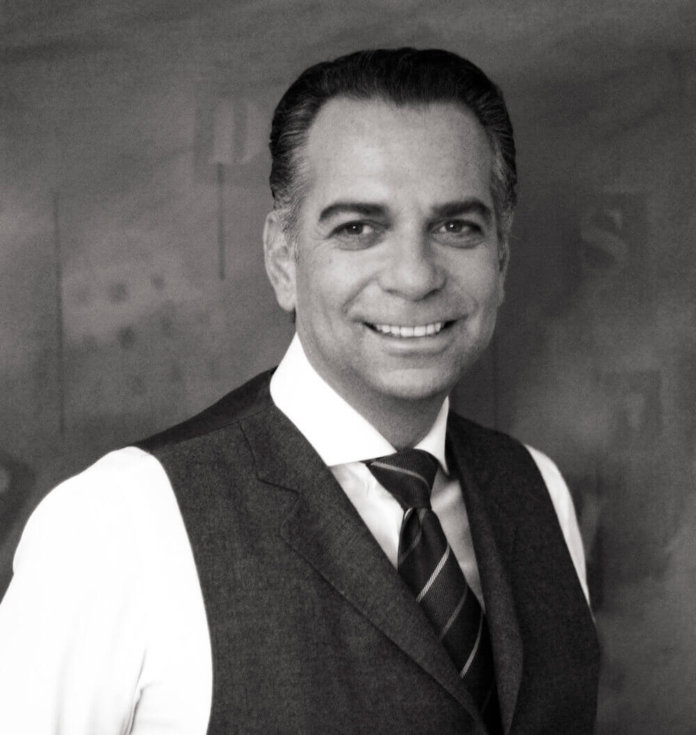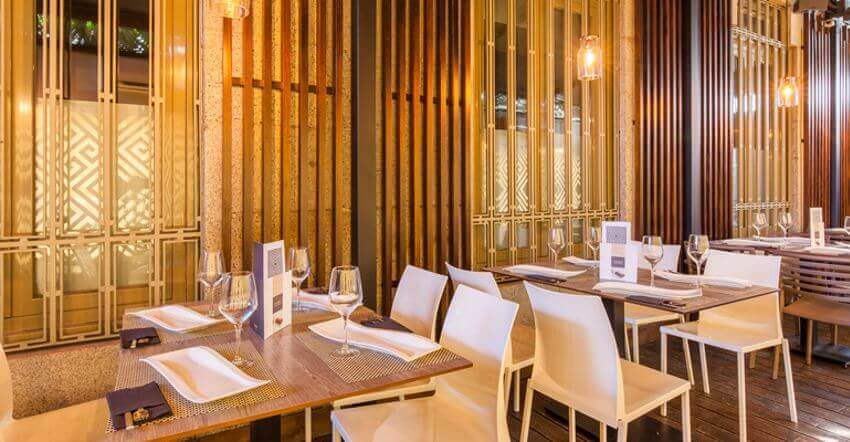
Bill Saad did not come from the hotel and catering world, but had always been interested in everything that had to do with customer experience, believing it to be an area in which one can constantly create and innovate. And when he arrived in Spain twelve years ago, he saw that there was an opportunity to turn his interests into a Lebanese-influenced gastronomic project unlike anything that could be found in Europe.
In this interview, Tharawat Magazine speaks to Bill Saad, President and Founder of the Shukran Group, the first Mediterranean Lebanese cuisine chain in Europe, about his innovative and challenging entrepreneurial adventure.
How did you get the idea to start Shukran?
In the beginning, I was interested in filling in an empty space that I realized existed in Spain; there were a number of classic Arabic restaurants, but not many that were catered to the modern sensibility. So, I thought that a new concept could work: Mediterranean cuisine merged with Lebanese gastronomy in a cosmopolitan and up-to-date environment. It would also be a restaurant where the client would be treated in an exceptional way and where they could enjoy excellent food for a very affordable price.
After the success of the first restaurant, we decided to expand and convert the brand into the first European chain of Lebanese restaurants. We saw potential in the restaurant in that it had characteristics that were easy to export, and so we developed a master franchise model because it seemed to be the most effective way to attain our expansion goal. Currently, we have 5 restaurants operating in Madrid and soon we will open additional locations in England and Portugal.

What was it like running the restaurants, as someone who does not have a background in the industry?
Actually, I do not run the restaurants; once the concept was created, what I did was to put together a good team to make it work. And one of the best changes I made was to put in charge a person who did not come from the restaurant sector. For some, this idea may seem crazy, but I wanted my project run by someone with a fresh perspective and to whom the word “impossible” was not an option. And that person, Patricia Gallego, our current General Manager, was responsible for giving that 180 degree turn that transformed the Shukran restaurant chain into the Shukran Group.
Returning to the question, the main challenge when running a restaurant is that the client needs to feel like they are treated like a king, even if they are paying just 30 euros. That feeling of comfort, wellbeing, and pleasant evocation comes not only from good food, but also from the way they are made to feel. And you can only do that if you take all the details into maximum consideration, from how you receive the client to how you say goodbye. If the client felt they were well-treated, they will return.
What motivated the change from a restaurant chain to a franchising model?
The ambition to expand. We have to start small but think big. I follow the principle, “Draw a good model and then replicate it.”
For those of us who might not be familiar, take us behind what it is like to run a franchising company and the process of working with franchisees.
It is crucial that the franchisee feels they are supported at all times, feeling that we are all part of the same family that shares the same goals, dreams and illusions. For that to happen, we offer them continuing support all areas of work that managing a restaurant involves: administration, marketing, customer service, product treatment, safety, quality, and so on.
The communication between everybody is also crucial, so we have implemented a system which allows our partners to be informed at all times about the projects, decisions, and investments that are being made by the parent company; transparency is extremely important for us. Furthermore, we have a fast and efficient procedure to solve incidences and we always keep our ears open to listen to the opinions and suggestions of our franchisees.
As a franchise, we have a unique process in which all our food is developed and made in a central factory, which acts as our gastronomic innovation centre from where the food is distributed to each restaurant. This way, we ensure the quality and homogeneity of the flavours and recipes in each one of our restaurants and, at the same time, we make the franchisee’s job easier because they can focus on optimizing their expenses in raw products, services and staff.
Another benefit of operating a franchise is that the company’s image and marketing campaigns come from the central company, which we optimize for our franchisees.
What do you feel is the biggest difference between operating a franchising company instead of one restaurant?
The main challenge is that the client needs to feel equally well treated and fed, regardless of whichever restaurant they choose to enter. The Shukran Experience must always be the same, and the clients who come into one of our restaurants must know that they will always find what they came there looking for. So as a franchise we must invest a lot in training our associates and thus ensure that the standards we established are followed in each one of the restaurants.
What are your plans for growth and expansion?
Our franchising formula has been very successful as business, since it is so easy for franchisees to open a Shukran restaurant. You do not need a gourmet chef because you can learn how to cook our products very fast and we have designed everything to be practical and simple. Furthermore, it is a formula that can be fully replicated in different countries, not only in Europe but in the whole world, which is why we are implementing our global expansion plans this year. In 2017, Shukran Group is working to open 17 restaurants and to reach, through its distribution department, more than 830 points of sales among food companies and major retail outlets.
Additionally, 2020 is the year we expect Shukran Group to be consolidated as a global company, with over 100 restaurants in several countries and a distribution network of gastronomic products to over 2,500 points of sales, with annual revenue forecast at 45 million euros.
What do you think it takes to achieve success in a fast moving and competitive field such as the restaurant industry?
For me, the most important aspect is to create a kind of timeless restaurant, not based on the latest trends that may not stand the test of time. We are working with a rich gastronomic culture with a deep rooted history that has lasted throughout a millenia, and that is what we want to carry across our restaurants. The quality of the Mediterranean diet and the wonderful flavours and aromas of Lebanon go far beyond fleeing trends.
What were the high’s and low’s of your entrepreneurial journey?
The best part for me was the team that has been put together around Shukran. Patricia Gallego has managed to gather an excellent group of people who feel and live Shukran, and that is what makes us move forward. A perfect company does not exist, but when you are able to motivate your team and charge ahead, that makes it so much easier to make everything work. The enthusiasm of the team is what keeps the machine running.
In regards to the challenges, I think that it had to do with channelling funds in a balanced way. Shukran started off with a big investment, maybe too big. As we were preparing ourselves to convert into the Shukran Group and our goals changed, we had to focus, administrate our resources better, and rationalize expenses more suitably.
Do you have any advice for other entrepreneurs?
The best advice that I can give is for them to work with passion and to dream. Dreaming is not only for children; it can simply be to pick up a piece of paper and pen and to draw a map, to know where you want to go, and to define how you want to do it. Entrepreneurs must have a vision because without it, they will not be able to move forward. Every day they must take a look at the goals they set for themselves and constantly revise them and really focus on the details.
I would also say that they must not be afraid to change; as we follow the established path, we must never stop looking left and right. Also important: you must have fun. You cannot always work and work while waiting to be happy when you get to the finish line. You have to enjoy the path, and in the end, that is the most important.









